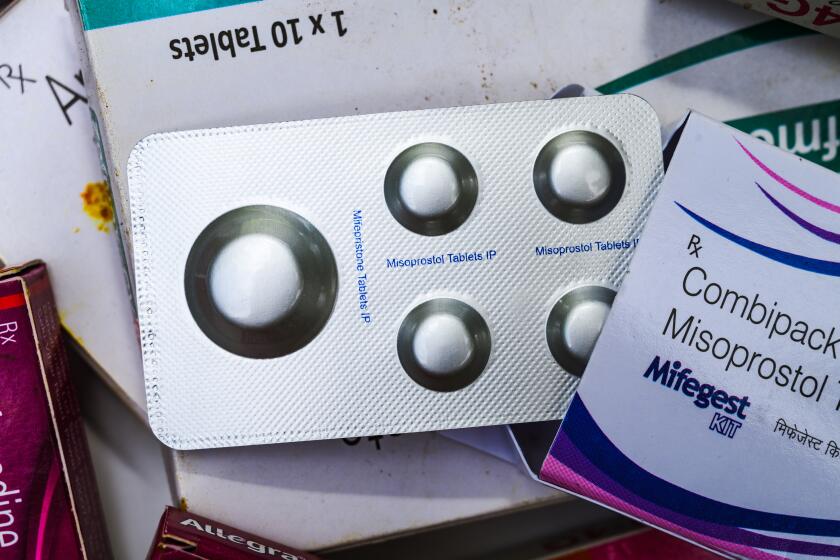Supreme Court sides with FDA on abortion pills, blocks Texas rulings for now

- Share via
WASHINGTON — The Supreme Court on Friday ruled for the Biden administration to preserve legal access in most of the nation to an abortion pill that is part of the most common method of ending early pregnancies.
In an unsigned order, the justices blocked rulings by a Texas judge and the 5th Circuit Court of Appeals that could have sharply restricted use of the pills or taken them off the market entirely. There were two dissents, from Justices Clarence Thomas and Samuel A. Alito Jr.
More than 5 million women in the U.S. have used mifepristone since the Food and Drug Administration declared in 2000 that it was safe and effective.
The decision sends the case back to lower courts with a signal that most of the justices believe this challenge to the abortion pill will fail in the end.
The case posed the most important abortion question to reach the high court since last year’s 5-4 decision that overturned Roe vs. Wade and the constitutional right to abortion.
Though the three justices appointed by President Trump — Neil M. Gorsuch, Brett M. Kavanaugh and Amy Coney Barrett — voted last year to overturn Roe, they appear to have joined the court’s liberals and Chief Justice John G. Roberts Jr. on Friday to put the Texas court rulings on hold.
Since the overturning of Roe, Texas and a dozen other Republican-led states have essentially made abortion illegal and prohibited doctors from performing surgery or prescribing abortion pills. The ruling by a Texas-based judge had threatened access to mifepristone, even in states where abortion remains legal.
President Biden welcomed Friday’s decision.
“I continue to stand by FDA’s evidence-based approval of mifepristone, and my administration will continue to defend FDA’s independent, expert authority to review, approve and regulate a wide range of prescription drugs,” he said.
The fast-moving case posed a test for Gorsuch, Kavanaugh and Barrett. Last year, they said overturning Roe vs. Wade meant that elected officials, not judges, would decide the availability of abortion.
That did not stop U.S. District Judge Matthew J. Kacsmaryk, a Trump appointee in Amarillo, Texas, from handing down a broad ruling this month that would have taken mifepristone off the market. Had Gorsuch, Kavanaugh and Barrett joined Thomas and Alito, that decision would have gone into effect.
The court’s decision in the mifepristone case resembles an earlier clash over Obamacare.
Shortly after Barrett was confirmed in October 2020, the justices faced a Texas-based lawsuit that threatened to strike down the healthcare law. The conservative challengers had won before a Texas judge and the 5th Circuit Court. The justices tossed out the suit in a 7-2 decision.
Friday’s order is not a final ruling, and the justices gave no explanation for their decision.
Next month, the conservative 5th Circuit will review the district judge’s decision that the FDA wrongly approved the use of mifepristone as safe. If the appeals court rules against the FDA again, the Biden administration will ask the Supreme Court to review the case and rule on the issue.
Friday’s order suggests that the FDA would probably win. Under the court’s rules, the justices usually intervene to block a preliminary ruling if they believe it is mistaken and likely to be reversed on appeal.
In this instance, the administration’s lawyers argued that the antiabortion activists who sued the FDA over mifepristone had no legal standing. They would not suffer a direct or personal injury because other doctors prescribe the drug. The administration also argued that the lower court judges were wrong to second-guess the FDA’s judgment about the safety of a drug that has been used for decades.
The challenge to mifepristone arose in the fall. A group of antiabortion advocates that included doctors set up an office in Amarillo and filed a lawsuit to challenge the safety of the drug.
The pill had been used widely in Europe before the FDA approved it in 2000. When taken in combination with misoprostol, the medications cause cramping and bleeding; serious complications are “exceedingly rare,” the agency said.
Based on the safety record, the FDA in 2016 relaxed regulations on mifepristone. Since then, patients seeking access to it need only a single visit to a healthcare provider and may use the medication through 10 weeks of pregnancy, versus seven weeks under earlier regulations. Soon after Biden took office, the FDA approved sending the pills through the mail.
But as widely predicted, Kacsmaryk ruled for the antiabortion activists and revoked the FDA’s approval of the drug.
The Justice Department appealed to the 5th Circuit Court. Though one appellate judge favored putting Kacsmaryk’s entire decision on hold, two others agreed with part of his ruling and suspended the FDA’s regulations starting from 2016.
U.S. Solicitor Gen. Elizabeth Prelogar sent an emergency appeal to the high court and urged the justices to block the lower court rulings. She noted that the abortion pills have a safety record of more than 20 years, and no federal judge had ever overruled the FDA’s judgment about the safety of a drug.
More to Read
Get the L.A. Times Politics newsletter
Deeply reported insights into legislation, politics and policy from Sacramento, Washington and beyond. In your inbox three times per week.
You may occasionally receive promotional content from the Los Angeles Times.











